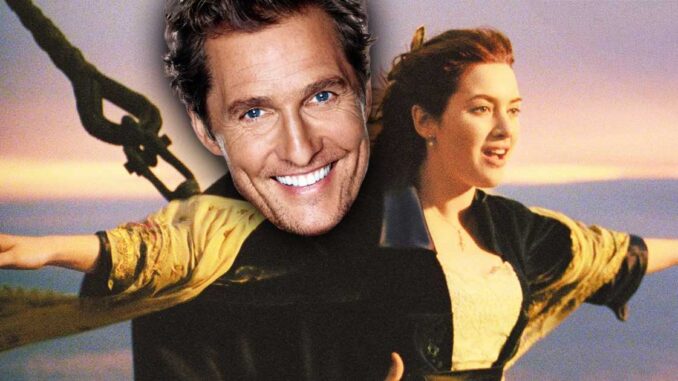
The Ghost Ship of Opportunity: Why Matthew McConaughey Missed His Titanic Voyage
The image of Jack Dawson, the charming artist with a winning smile, immortalized in the form of Leonardo DiCaprio, is practically synonymous with James Cameron's "Titanic." It's hard to imagine anyone else in the role. Yet, history, like the iceberg that doomed the unsinkable ship, took a slight detour, presenting the part to a young Matthew McConaughey. Why then, did McConaughey, on the cusp of superstardom, relinquish the chance to embark on what would become one of cinema's most lucrative voyages? The reasons, layered and complex like the ship's decks, involve chemistry, ego, and a dash of Hollywood fate.
The initial attraction was undeniable. McConaughey, with his signature drawl, laid-back charisma, and burgeoning filmography, was a serious contender. He reportedly did a screen test with Kate Winslet, and while accounts differ, many suggest the chemistry sizzled. The potential pairing was a tantalizing prospect – a charismatic Texan juxtaposed against the fiery English rose. Why then, didn't McConaughey secure his berth on the Titanic?
One prevalent explanation revolves around the film's director, James Cameron, and his vision for the character. Cameron, known for his meticulous control and specific artistic desires, allegedly envisioned a younger, more vulnerable Jack Dawson. DiCaprio, barely out of his teens, possessed an ethereal beauty and a vulnerability that resonated deeply with Cameron's interpretation. McConaughey, already in his mid-twenties, exuded a more mature, worldly confidence that arguably clashed with the desired youthful naivety. The film needed a boyish charm, a sense of innocent wonder at the opulence and drama unfolding around him. While McConaughey undeniably possessed charm, it was a different kind, one that perhaps hinted at a deeper, more experienced man than Cameron envisioned.
Further complicating matters were potential studio concerns regarding McConaughey's burgeoning star power. While undeniably charismatic, he was still considered a relative newcomer, not the established box office draw that Leonardo DiCaprio was becoming. The studio, naturally, wanted a name that would guarantee ticket sales, and DiCaprio, with his recent successes in films like "Romeo + Juliet," held a significant advantage. In the cutthroat world of Hollywood, established names often trump raw talent, especially when a multi-million dollar budget hangs in the balance. Casting DiCaprio was perceived as a safer bet, a less risky investment in the long-term profitability of the film.
Beyond the practical considerations, there's an undeniable element of serendipity at play. McConaughey himself has hinted at a feeling that the role wasn't his to take. Perhaps he sensed a disconnect, a misalignment between his own artistic inclinations and the film's grand vision. Maybe, deep down, he recognized that DiCaprio was the right actor for the job. It's a testament to his maturity that he didn't cling to the opportunity, recognizing that sometimes, the best roles are the ones you don't get.
Ultimately, the reason Matthew McConaughey missed his chance to star in "Titanic" is a confluence of factors. It was a matter of creative vision, studio politics, and a touch of cosmic alignment. While the role might have catapulted him to an even faster level of fame, it's arguably his subsequent choices, the roles he embraced, that have shaped him into the Oscar-winning actor he is today. Like the survivors of the Titanic, McConaughey charted his own course, navigated the treacherous waters of Hollywood, and emerged, not unscathed, but ultimately stronger, proving that even a missed voyage can lead to unexpected and rewarding destinations. The legend of Jack Dawson belongs to DiCaprio, but the legend of Matthew McConaughey continues to unfold, a testament to the power of talent, perseverance, and a healthy dose of Hollywood fate.